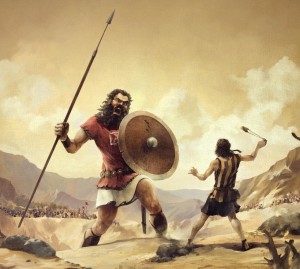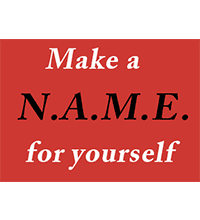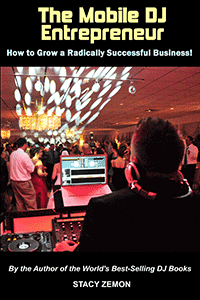
By Doug Sandler, “Nice Guys Finish First”
You may not feel this way when you lose a deal to a huge company, or when you look at your checking account and see there is $3.05 balance, but there are many advantages to playing the role of David, in the age old story of David versus Goliath. When you’re David, you may feel as though you need to add substance to your structure and add a level to your legitimacy, especially when your wife brings your two year old into your home office so you can change a poopy diaper, but let me assure you, being the little guy (I am talking about your business, not your kid) has some sharp advantages.
Personally, I like to be considered David, in the business battle of David versus Goliath. I have been very fortunate to knock down Goliath more times than he has knocked me down. Even “Mr. Nice Guy” likes to win the time tested battle between little and big. When you are David, the competition never expects much out of you. Because you are so small, you rarely if ever, are perceived as a threat. So he (Goliath) never sees me coming; that’s Goliath’s first problem.
“When you are David, you may feel as though you need to add substance to your structure and add a level to your legitimacy, especially when your wife brings your two year old into your home office so you can change a poopy diaper…”
Here are the six advantages to being David:
1. Change comes easier when you are David. When you are David, your ability to institute change will quickly allow you to market differently, revise business plans and work towards collecting more customers. In today’s business climate, trends seemingly change overnight. The companies that can capitalize on changing fast will rise to the top of the ladder. And while it’s great to have the financial backing and stability Goliath has, he has difficulty making decisions without meetings, conference calls and Board involvement. I don’t know about you, but my philosophy has always been that the best conference call was the one never made. Bottom line, Goliath has a challenge with change, while David should use it as a springboard to success.
2. David is faster. Try making a decision when you are Goliath. Even if you see a great market trend that you want to take advantage of Goliath has a tough time turning on a dime. David is nimble and swift, can resolve problems faster and will stay up late, work long hours and drive more miles to get things done for you. David can hand carry a check request through accounting, quickly confirm your product shipped off the loading dock and respond to a call, text message or email without dealing with red tape. When Goliath starts to empower his people to make decisions and trusts his staff to get the job done right, he will be able to compete with David. In the meantime, he’s usually caught flat footed and is as slow as molasses.
“Goliath values the masses while David values the individual.”
3. David is more personal with customers. I can vividly remember calling my credit card company to dispute a duplicate charge. When I was finally able to connect with a human being, I was asked no less than three times my credit card number and security password. Once I established with Goliath that I was actually me they could not seem to pronounce my name properly. For some unknown reason they kept referring to me as Dough (rhymes with “no”). I was not feeling like a frozen pizza that day so I was not humored that Goliath couldn’t get it right. If David messes my name up, he apologizes, feels bad and corrects himself. Rarely if ever do I feel like a number when dealing with David.
4. Connecting with staff when you are Goliath is challenging. Walk into 99% of the Goliath organizations in the world and you will find poisonous politics, watercooler whisperings and a cultures of caution. It’s so incredibly hard to get everyone on the same page to create the “all for one and one for all mentality.” The cause of this is not just size alone. Companies like Zappos, Wegmans, Google and eBay (all Goliaths) have excelled at creating this David feeling within a Goliath organization in part, because they have upper management buy-in. When management takes time to remember what it was like to be a staffer in the trenches, Goliath becomes much more relatable to everyone within the organization.
“Sure, Goliath tells you he cares, as you are prompted through the automated phone system, but don’t believe him, it’s just an illusion.”
5. Sure, Goliath tells you he cares, as you are prompted through his automated phone system, but don’t believe him. Call your local utility company, or your “big box” insurance carrier and tell me they care. Sure, they tell you they care, as you are prompted through the automated phone system, but don’t believe them, it’s just an illusion. If you do get to finally speak with someone, work hard at getting them to put down their script long enough to actually have a conversation with you. Goliath values the masses while David values the individual. This point in particular challenges me because I not exactly sure why it needs to be this way. I have a friend who created a philosophy that teaches “people over products.” Once Goliath recognizes the not-so-hidden secret of those three words, David will need to watch out. In the meantime money is dumped into product development, engineering and marketing metrics to try and fabricate adding value to client relationships.
6. Speaking of metrics, big company, big data, no feelings. Little company, little data, but big on emotion. What’s the ROI on crying happy tears? Goliath is way too clumsy to hear or see the little customer. He relies upon big data, metrics by the millions, profit and loss statements and balance sheets. David relies upon emotion, feelings and gut. If Goliath understands the individual customer’s needs and works hard at creating an incredible customer experience, he will be able to challenge David at his own game. But it’s so rare that Goliath actually takes time to care about the single unit statistics like handshakes, smiles and hugs.
“What’s the ROI on crying happy tears? Goliath is way too clumsy to hear or see the little customer the way David does.”
As for me, since I landed my first job at the age of 13 in 1977 I’ve acted like David. Even when I worked for Goliath time and time again until the early 1990s I acted like David. I think most people with an entrepreneurial spirit relate more to David than Goliath. The trick is, keeping that system in place when, if ever, you grow beyond your small business. I like the intimacy provided by being the little guy. Watch out Goliath, I may be little, but my slingshot carries a powerful punch.




